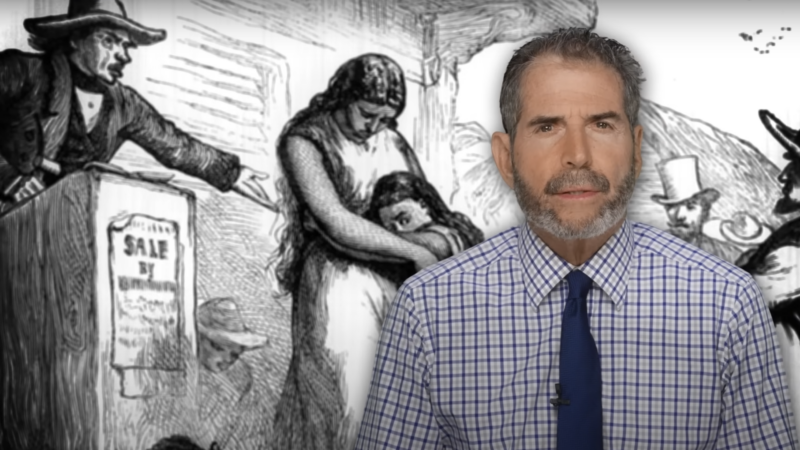Slavery Was a Global Phenomenon
American slavery was horrible—and far from unique.

Today people are taught, when it comes to slavery, America was the worst.
Sen. Tim Kaine (D–Va.) actually said, "The United States didn't inherit slavery from anybody; we created it."
An MSNBC "expert" claims "American slavery was worse because slaves were treated as property."
"That's complete nonsense," replies political science professor Wilfred Reilly in my new video. "Generational slavery, [where] if you're the son of a slave, you're a slave…that was extraordinarily common."
Reilly's new book, Lies My Liberal Teacher Told Me, rebuts anti-American propaganda that dominates many American schoolbooks today.
Partly thanks to The New York Times' 1619 Project, students are taught that "America's slavery [was] unlike anything that had existed before."
"There's nothing wrong with acknowledging your historical mistakes," Reilly responds. "I'm black, Irish, a bit Native American….Those are three peoples who have experienced a great deal historically. Nothing wrong with acknowledging that. But it's extremely odd to focus only on the negatives of your society. And to exaggerate those!"
Kids are now taught that slavers bought people in Africa and shipped them to the United States. Few are taught that most were shipped elsewhere.
"Between 10.7 million and 12 million slaves from Africa went to the New World—we got a little under 400,000," says Reilly. That's less than 4 percent.
"The extreme focus on slavery in the United States, why did that happen?" asks Reilly. "One reason is that a lot of black people survived here. Slavery was harsh, but a lot less harsh than clearing the Brazilian jungle."
"But American blacks are at a disadvantage," I push back. "They have less capital, financial and educational capital. What's the harm in pointing out how abusive white people were?"
"The harm," he replies, "is that pointing out how abusive white people were is not going to get black Americans any more capital. Most problems in the modern black community don't have anything to do with historical ethnic conflict 160 years ago."
Reilly says today's problems began when government welfare began.
"Crime in the black community," he says, "increased about 800 percent between [around] 1963 and 1993. Racism didn't increase between 1960 and the modern era. You're looking at the impacts of the Great Society, the welfare programs."
It's better to teach the truth, says Reilly—almost every society had slavery.
"The Arabs were history's premier slave traders. Muslims took so many blonde slaves out of the [Slavic] region, they gave the world the name 'Slav,' [for] 'slave,' to the global slave population."
Arabs captured and enslaved more than a million Europeans.
Years later, the first people who seriously tried to abolish slavery were white Westerners: The British and then Americans. They called slavery immoral.
"Yeah, the British Navy," Reilly explains, "in a story almost no one now knows, sank 1,600 slave ships. They freed 150,000 people that were enslaved at the time."
By contrast, Saudi Arabia only abolished slavery in 1962. And even now, the Global Slavery Index estimates that there are still 700,000 slaves in Saudi Arabia.
"Where there were no westerners," Reilly notes, "you'd have a lot of slavery for a long time."
American slavery was horrible. But it wasn't unique. And we didn't "create it." Our culture would be healthier if we learned about that.
Schools dwelling on early America's evils hasn't helped Americans get over them.
Gallup polls show that since schools started focusing on racism, race relations got worse.
"The idea of generational slavery, the idea of slave trading," Reilly says, "none of that was unique to America. You don't need radicalism to critique the worst excess of an existing system. All you need is incrementalism and honesty."
Next week, I'll report on another myth: the claim that, before Christopher Columbus, the natives were "kind stewards of the environment."
Kids believe it. After all, it's what Disney movies teach.
But that's not true either.
COPYRIGHT 2024 BY JFS PRODUCTIONS INC.


Show Comments (121)